 | The Xenophile Historian |

 |
The Anglo-American Adventure
Chapter 6: The USA Today
(Not the newspaper!)

This paper covers the following topics:
| An Election Like No Other | |
| The Incredible Expanding Government | |
| From History to Current Events | |
| Go to Page Navigator |

An Election Like No Other
Long before the campaigns started, it was clear that the 2008 presidential election would be different. First, it was the first time since 1928 that neither an incumbent president nor vice-president was running. Second, it was the first election in which the candidates spent a combined total of more than a billion dollars (for a job that pays $400,000 a year!), though that wasn't apparent until it was all over. Third, the length of the campaigns was longer than ever; the first state primary and caucus elections were moved ahead from February to January, while the nominating conventions were pushed back from midsummer to late August-early September. This meant that a candidate who was serious about winning had to start running by early 2007.
The conservative base of the Republican Party offered several candidates, none of which was satisfactory to everyone, while the GOP's moderate faction had one candidate, John McCain. McCain was well known because he had run for president eight years earlier. He also had a reputation for being a "maverick," because he got along better with Washington Democrats than with the social and religious conservatives in his own party. With those who opposed him unable to agree on a candidate, he gained an early lead in the first primaries, and never lost it. By March, most of the other Republicans had dropped out of the race.
As for the Democrats, the early favorite was Hillary Clinton. However, she also came with considerable baggage, starting with her husband; it wasn't clear whether Hillary, if elected, would serve a first term as president or a third term as Bill's co-president. It certainly didn't help when Bill campaigned for her, and occasionally let his tongue slip, saying "if you elect me" instead of "if you elect Hillary." There also was a nagging feeling that something was wrong with a system where, in a nation of 300+ million people, the candidates came from only a few families; for the past five presidential elections, the major parties had nominated either a Bush or a Clinton. Finally, bad memories from the 1990s gave Hillary high negative ratings in the polls, to the point that many Democrats looked for an alternative. The anti-Clinton they chose was a newcomer to national politics, Barack Hussein Obama.
Obama had given an inspiring speech at the Democratic convention in 2004, and was elected to the Senate in the same year; before all that, virtually no one outside of Illinois had heard of him. Thus, of all the dark horses who had run for president over the years, he was the most mysterious of all; even his place of birth was uncertain, but assumed to be at a hospital in Hawaii.(1) Like most Democratic candidates since the 1960s, Obama's views and platform were far to the left of mainstream opinion, but because he was charismatic and had biracial ancestry (his mother came from Kansas, and his father was a Luo tribesman from Kenya), voters found him more interesting than any white liberal. While Clinton won the primaries in the biggest states, Obama's supporters were more persistent, so he won most of the caucuses and the smaller primaries, and ended up with slightly more delegates. In June Clinton conceded defeat, and the Democratic convention took on the appearance of a coronation, complete with a stage resembling the ancient Altar of Zeus at Pergamun, at the stadium where Obama gave his acceptance speech.
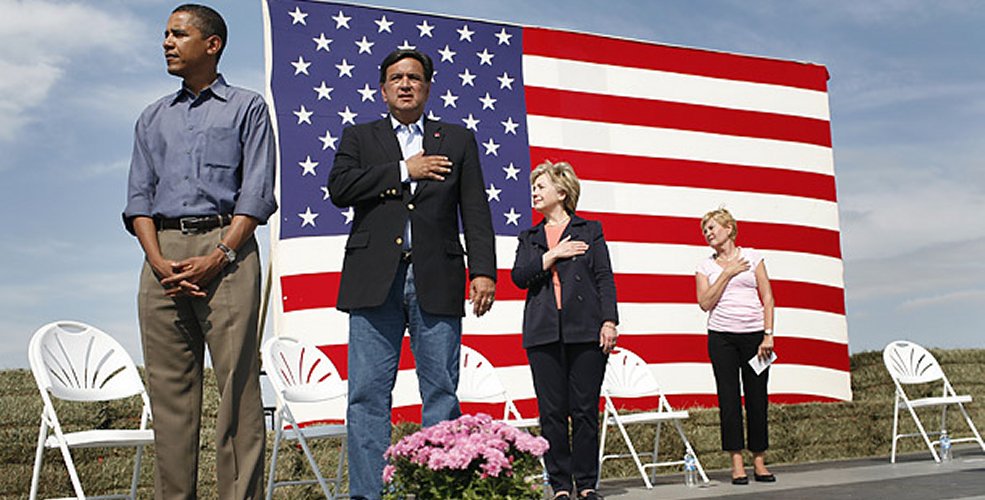
Throughout the summer, Obama was ahead in the polls by double-digit figures. Most of the journalists in the mainstream media, newspapers as well as radio/TV networks, had been creeping more to the left over the years; now when Obama pulled into the lead, they stopped even pretending to have an objective opinion, and endorsed Obama like a squad of cheerleaders rooting for their team.(2) Meanwhile, the Republicans showed that they had learned nothing from the Grant presidency, or at least from 1996; old soldiers should fade away, not go to the White House. McCain couldn't generate much excitement until he chose an attractive conservative, Alaska Governor Sarah Palin, as his running mate. With Palin on the ticket, conservative Republicans finally came out in support of McCain, allowing him to catch up in the polls in August and early September.
That was when the bottom dropped out of the economy. Real estate prices had peaked in 2005, and stocks peaked in 2007, so the economy as a whole was sluggish as 2008 began. Sensing trouble, Bush and a majority of congressmen got together to pass a huge tax rebate ($300-$600 for each individual filing an income tax return, and $600-1,200 for each couple), which they called an "economic stimulus." In addition, millions of Americans had run up debt by living beyond their means, and energy costs were at an all-time high (the price of crude oil reached $147.30 a barrel in July); both put serious strains on the budgets of most families and businesses. Still, few realized that the first economic boom of the twenty-first century would end so soon, or so suddenly.
Whereas the Great Depression had been caused by overextended investors, borrowing too much money to buy stocks, this time the crash was caused by an overextended real estate industry. Over the years, owning your own home had come to be seen as part of the "American dream," and in the 1990s, to bring that dream to as many Americans as possible, several politicians ordered financial institutions to provide home loans to people who didn't qualify for them before. As with stocks in 1929, many bought houses that were too expensive with too little cash; the banks complied because they blindly assumed that real estate prices would go up forever. Now with the cost of fuel and heating oil increasing, the cost of everything dependent on energy (e.g., food) increased, too. This forced homeowners to choose between making mortgage payments or buying groceries, a full tank of gasoline, etc., and as more and more owners of "subprime mortgages" defaulted on their loans, financial institutions began to lose money, instead of making it.
For non-economists, the first clear sign of approaching trouble was the collapse in March of Bear Stearns, a major Wall Street investment bank. Then in September two of the nation's largest mortgage corporations, the Federal National Mortgage Association (FNMA or "Fannie Mae") and the Federal Home Loan Mortgage Corporation (FHLMC or "Freddie Mac"), declared themselves financially insolvent, and the federal government took over both for the time being to prevent the situation in the housing market from getting worse.(3)
On September 18, 2008, the Federal Reserve System noticed a tremendous drawdown from money market accounts in the United States, an estimated withdrawal of $550 billion in an hour or two. The Treasury Department stopped the run by releasing $105 billion in funds; then it closed down the accounts in question and tried to head off panic by announcing that henceforth, the FDIC would raise its insurance limit, from $100,000 to $250,000 per bank account. According to Treasury Secretary Henry Paulson and Federal Reserve Chairman Ben Bernanke, if they hadn't acted as quickly as they did, $5.5 trillion would have been withdrawn. At this point, nobody knows who was pulling out the money; presumably it was a foreign power (Russia? China? Saudi Arabia? Venezuela?), or a group of very wealthy individuals like George Soros, who at least wanted to influence the election, if not destroy the US economy. Despite the magnitude of this charge, few seem to have even noticed what happened; about the only one in Washington who did, outside the affected federal departments, was Congressman Paul Kanjorski (D-PA). With hindsight, though, this may be remembered as the trigger of the 2008-09 recession, just as unusually heavy sales on Wall Street triggered the 1929 stock market collapse.
Unfortunately, the trouble did not stop there; also in September, Merrill Lynch was sold and Lehman Brothers went bankrupt, leaving Morgan Stanley and Goldman Sachs as the only remaining big investment banks. For retail banks like Citigroup and Washington Mutual, the situation was even worse; those that weren't bought out by competitors saw their shares trade on the stock market for a fraction of what they had been worth a year earlier. Finally the American International Group (AIG), one of the world's biggest insurance companies, suffered a catastrophic lowering of its credit rating, and it took emergency loans totaling $122.8 billion from the Federal Reserve Board to keep it afloat. This was justified with the argument that AIG was "too big to fail," meaning that it would have been worse to let the insurance giant collapse.
John McCain interrupted his campaign to go to Washington, to vote on a spending bill that would commit hundreds of billions of dollars to bail out the banks. This was in character for a military veteran, putting the country before personal interests, but others didn't see it the same way; some said he was chickening out. Looking back, it is now clear that the failing economy ensured that the Republicans would lose, and McCain's time-out ensured that the Democrats would win. Pundits like to say that people vote with their pocketbooks; they reelect incumbents when the economy is good, and turn them out (and their party) when the economy is bad. It had happened in 1932, 1980 and 1992, and now it happened again; the result on Election Day was 69 million votes for the community organizer from Chicago, 59 million for the old war hero.
2008 was also the first time that the Democrats won a presidential election without the South. In Chapter 4 and the first twenty-five years of Chapter 5, the South was the most loyal constituency of the Democratic Party. From 1800 to 1996, whenever a Democrat won, he took at least four states from the former Confederacy. And even after the South turned Republican, the Democrats needed Southern votes to win; five losing Democratic candidates (McGovern, Mondale, Dukakis, Gore and Kerry) did not carry any Southern states at all. Finally, among the eighteen Democrats that became president, eleven were Southerners (the exceptions were Van Buren, Pierce, Buchanan, Cleveland, FDR, JFK, and Obama). In 2008, however, Obama carried just Florida, Virginia and North Carolina. But even if all three of those states had voted for McCain, it wouldn't have changed the outcome; Obama got all the votes he needed by winning the entire North and half of the West.


The Incredible Expanding Government
From Chapter 2 onward, American history has been a story of growth. In Chapter 2 we saw the future American community grow in population and confidence, until it was ready to survive on its own. In Chapter 3 the theme was growth in the amount of land; thirty-four states joined the Union during that time, compared with fourteen in Chapter 4 and two in Chapter 5. Then in Chapter 4 it was growth in wealth and military power.
All those trends have continued, but in Chapter 5 a new trend became dominant: the years since 1933 have been an age of massive federal government growth. Before the Civil War, the federal government only occasionally interfered in the lives of ordinary Americans; now with taxes, Social Security, Medicare and endless regulations, it meddles in our lives constantly. And much of Uncle Sam's growth has come at the expanse of the states; whereas the Constitution gave nearly as much attention to the rights of states as it did to the rights of individuals, today the state governments have become largely irrelevant to most of us.(4) The process is an incremental one, moving so slowly that few folks are aware of the changes, so look at the examples below to see how far we have traveled down that road.
Federal Spending
In 1790, the budget for George Washington's government was $5.1 million. Divide that between 3.9 million people, the US population at the time, and the amount of spending was $1.30 for every man, woman and child in the nation. In the nineteenth century, annual federal spending only exceeded $1 billion twice: in 1865 (the Civil War, of course) and after 1890. By 1933, the budget had climbed to $5.1 billion, Washington's budget times 1,000. For Fiscal Year 2009, before the massive bailouts that came with the 2008 recession, it was $3.1 trillion, which works out to $10,200 spent on every American. Of course everything costs more today than it did two hundred years ago (nowadays the 1790 budget would only pay for a medium-sized office building full of bureaucrats), but Uncle Sam is also spending money on a lot of things which didn't exist in the past, like the space program (5), or for things which previous generations of Americans didn't feel they needed from the government.
In Chapter 4, we noted that Calvin Coolidge was the last president who actually cut federal spending; even Ronald Reagan could only reduce the rate at which spending grew (nevertheless, liberals called that a spending cut!).(6) In years of prosperity (mainly in the 1950s, 80s and 90s), spending increased gradually, to cover ever-increasing costs; in times of hardship, spending increased even faster, to deal with the crises the nation faced. Furthermore, the cost of every spending program always exceeds what the president, Congress, and others say it will cost. Part of this overrun is due to increased expectations, part of it is the desire by bureaucrats to avoid a budget cut next year ("use it or lose it"), and part of it is simply inefficiency; it has been estimated that out of every federal dollar spent to help the poor, only twenty-eight cents actually reaches the intended recipient (a worse figure than you'll see with most charities).
Federal Agencies
Speaking of things which didn't exist in the past, most of the government growth and spending came about because new agencies were created to fill specific needs. Each of those agencies required new workers who needed to be paid, and once an agency was up and running, it could usually find a reason to stay in existence, so doing away with it when it was no longer needed became nearly impossible.(7) Consider the federal agencies listed below; can you imagine modern life without them? The founding date is listed after each:
- Federal Communications Commission (FCC) = 1934
- Securities and Exchange Commission (SEC) = 1934
- Social Security = 1935
- Central Intelligence Agency (CIA) = 1947
- Medicare and Medicaid = 1965
- Environmental Protection Agency (EPA) = 1970
- Occupational Safety and Health Administration (OSHA) = 1971
- Bureau of Alcohol, Tobacco, Firearms and Explosives = 1972 (replaced the Bureau of Alcohol, Tobacco and Firearms, which had been around since 1920)
- Drug Enforcement Administration (DEA) = 1973
- Federal Emergency Management Administration (FEMA) = 1979
Taxes and Regulation
Because money equals power in a capitalist society, the federal government has grown stronger and more intrusive with each spending increase. For example, when the Sixteenth Amendment, which legalized a federal income tax, was passed in 1913, it only taxed those making more than $3,000 a year, and the tax rate started at just one percent. Moreover, the first federal income tax form was three pages long, and it came with one page of instructions (you can download the 1913 form from the IRS website). Compare that with today's tax bracket, which starts at fifteen percent. Even worse, the tax code itself changes every year, and it currently requires 155 pages of rules just for individuals filling out the 1040 form; that does not include the rules for businesses, or the rules for filling out whatever additional forms may be needed.

Because there were few federal regulations before that time, the government did not keep track of them until 1936, when it introduced a master list, the Federal Register. For its first year, 2,620 pages of regulations were published; compare that with the 80,700 pages published in 2008.
The Cabinet
In Chapter 3 we noted that Washington's Cabinet had only four members: the Secretary of State, Secretary of War, Secretary of the Treasury, and Attorney General. Over the next century and a half, six more positions were created: Navy (1798), Postmaster General (1829), Interior (1849), Agriculture (1889), Commerce (1903), and Labor (1913). Truman merged the War and Navy departments to create the Department of Defense (1947), and Nixon removed the Postmaster General (1971), but other recent presidents have created seven new departments: Health and Human Services (1953, originally called Health, Education and Welfare), Housing and Urban Development (1965), Transportation (1966), Energy (1977), Education (1979), Veterans Affairs (1988), and Homeland Security (2002).
Thus, today's Cabinet has fifteen departments. In addition, there are six Cabinet-level positions without executive departments, for the vice president, White House Chief of Staff, Director of the Office of Management and Budget, U.S. Trade Representative, Administrator of the Environmental Protection Agency, and the Director of the National Drug Control Policy. As with the federal agencies listed above, each Cabinet position increases the size and cost of government, and once a position is created, it is usually there to stay, whether it accomplishes anything or not. That is why the government is no closer to solving the nation's energy and education problems than it was when those departments were created.(8)
The best explanation I have heard for government growth is the so-called "ratchet effect." It is because of the ratchet effect that we find it easier to gain weight than to lose it, and why, as time goes on, that life gets more complicated in many areas. For example, designers will give new features to cars, appliances, and software that are initially seen as options or even luxuries, but later they are required. In his work Crisis and Leviathan, Robert Higgs described how the ratchet effect works with government: "Once a crisis has passed state power usually recedes again, but it rarely returns to its original levels; thus each emergency leaves the scope of government at least a little wider than before." We saw how the United States found itself unprepared to fight before the Civil War, the Spanish-American War, and the two World Wars, but after each of those conflicts ended, the size of the armed forces, spending, and the amount of government activity never returned to prewar levels. In part, that explains why governments are always more willing to raise taxes than to lower them, and why freedoms willingly surrendered by the public are not willingly returned.
From History to Current Events
We are now up to the present. The main difference between history and current events is that one happened long ago, while the other is happening now. For example, the Apollo missions to the moon were current events to those old enough to remember them, including the author, but they are history to everyone born since then. Likewise, we have reached the point in this narrative that to go on would have us looking at today's news, rather than at the past. So what can the past teach us about where we are going?
Thomas Jefferson once said that Americans need a revolution about every twenty years, to keep the American people aware of the freedoms they could lose if they don't pay attention. We haven't had that, but it seems that every seventy to eighty years there has been a major political upheaval, and it changed the nation permanently each time. The first such upheaval was the American Revolution, of course. The second upheaval, the Civil War, was also a case where a dispute turned violent, but the next one, in the early 1930s, was almost bloodless; uprisings were limited to the Bonus Army march and the labor strikes. Now in today's cities, acts of violence can lead to demonstrations, but that's as far as uprisings will go.
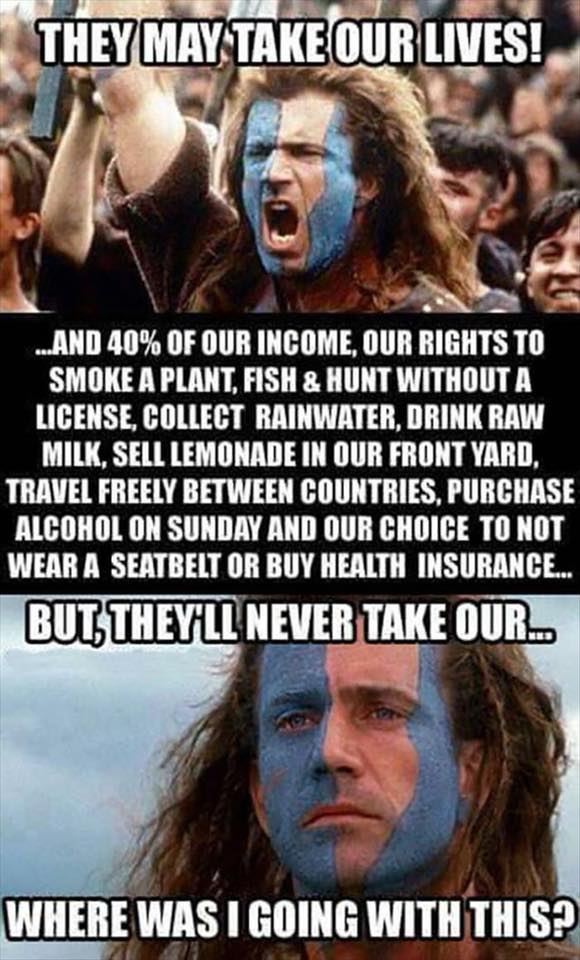
Braveheart in the 21st century.
Some of the history texts the author has read go so far as to talk about a "First Republic" for the years before the Civil War, a "Second Republic" between the Civil War and the Great Depression, and a "Third Republic" for events since the Depression, as if American history was like French history without the Jacobins and Bonapartes. The author saw enough merit in this formula to organize the chapters in this work accordingly. In Chapter 1, there was no government above the tribal level, except in fledgling European outposts like St. Augustine. In Chapters 2 and 3, a central government existed, but it usually acted as an absentee landlord, seldom interfering in the lives of most folks; in fact, it was an effort to make the government more intrusive that caused the American Revolution.
Before Chapter 4, it wasn't clear whether a citizen's first loyalty was to his state or to the federal government; that's why so many West Point-educated officers joined the Confederacy when the Civil War began. The Civil War answered that question; it established the rule that sovereignty belongs to the nation first and to the state second. Also, in the period covered by Chapter 4, we saw the government, more often than not, working on the side of big business. Then for this chapter, we had the age of the welfare state, when the government assumed more and more responsibilities that had previously been left to the people, in the name of reducing risk, danger and hardship; today one-sixth of the American people receive at least part of their income from the government.
Keep in mind that changes in government aren't obvious to most folks when they happen. The Roman Empire called itself a "Republic" until the end of its existence, though it stopped functioning as a republic in the first century B.C. Likewise, I expect the politicians in Washington will always pay lip service to the Constitution, whether or not they follow it.(9) Now it appears that the welfare state has run its course; spending for both cradle-to-grave social services and the world's finest armed forces appears to have reached its limits. The nation's leaders are learning the hard way that not all problems can be solved by throwing money at them. If you accept the theory of US history described above, the Third Republic ended with the 2008 election, and we are now witnessing the creation of a "Fourth Republic." Thus, if I compose another chapter on US history in the future, I will break off this chapter at 2008, and begin the next chapter from there.
Probably the biggest change is that in the future, the United States will not be the world's policeman. When Barack Obama made his first trip abroad as president, he spent much of it apologizing for American history, acting like a president without a country.(10) In addition, he announced he would cut defense spending, told an audience in Turkey that the US is not a Christian nation, treated friends of the United States (e.g., Britain, Israel) like enemies, and enemies (e.g., Venezuela) like friends. On the war front, he promised to keep troops in Afghanistan and Iraq for as long as necessary, but he also promised to close the detention center for terrorists at Guantanamo Bay, and so far has done nothing but talk about the nuclear threats posed by North Korea and Iran. Meanwhile, Washington renamed the War on Terror an "overseas contingency operation," called acts of terrorism "man caused disasters," and called the detainees at Guantanamo Bay "refugees," as if a war could be ended just by changing the terms used.
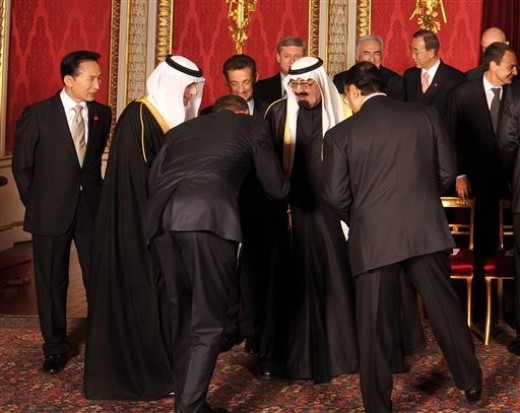
With the economy shrinking as well (the GDP dropped 6.3 percent in the last quarter of 2008, 5.7 percent in the first quarter of 2009, and 1 percent in the second quarter), it looks like in the next few years, the United States will see a serious decline in its power. This caused Walter Rodgers, a former CNN bureau chief, to write ecstatically that "America's... superpower status, is being downgraded as rapidly as its economy."(11) Unfortunately, the world has not yet reached the stage where the lion can lay down with the lamb, and in a world governed by force, at least one nation will use military or economic power to set policy for the rest. If it is no longer the United States, who will it be in the future? China or India, perhaps?
On the domestic front, we now arguably have a government more oppressive than the one the Founding Fathers rejected in 1776. Conservatives and Libertarians like to compare the present-day situation with a frog in a pot of boiling water. As the story goes, if you throw the frog into the pot and the water's already hot, it will jump out right away. On the other hand, if the water is cold or lukewarm, the frog will stay in the pot; then if you turn the heat up gradually, the frog will enjoy the bath--until it is cooked. Likewise, in recent years the American people, bit by bit, have given the federal government permission to do things that were once rejected out of hand, from income taxes to nationalized industries and health care.

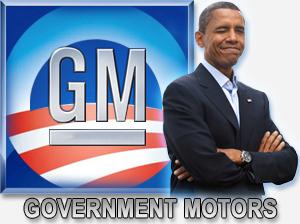
"Since the general civilization of mankind, I believe there are more instances of the abridgment of the freedom of the people by gradual and silent encroachments of those in power than by violent and sudden usurpation."--James Madison
A few years ago, Jared Diamond, an ecologist with an interest in history, wrote Collapse, in which he put forth his theories on why civilizations fail. He concluded that the five factors most likely to bring down a great nation are environmental damage, changing climate, loss of trading partners, hostile foreigners, and stupidity. If all a civilization has to face is one of the first four challenges, it will probably survive, and may come out of it stronger than before, as Rome did after vanquishing Carthage. On the other hand, if you combine any of the first four with stupidity, heaven help that nation!
How does Collapse apply to twenty-first-century America? I think it's safe to say that the environmental threat is under control. Compare today's pollution to what cities experienced a few decades ago; the carbon dioxide environmentalists are worried about isn't as bad as sulfuric acid, lead or excessive ozone in our atmosphere, or toxic waste running into our waterways. It also looks like climate change is not our most serious problem, since predictions made in the past about global warming, global cooling, overpopulation, epidemics, running out of oil, etc., simply haven't come true. And we're not suffering from a lack of trade; about the only countries that don't do business with the United States are those that don't have anything Americans want, like North Korea. On the other hand, the threat of hostile foreigners (e.g., Islamic terrorists, those who support them, and the last communists) is real, and the US had better deal with them as effectively as it did in the past with the American Indians, British, Germans, Japanese and Russians, in order to remain a successful nation in the future. That is where the stupidity factor comes in. We already saw the effect of stupidity on domestic affairs, in the form of "political correctness," and the growth of government beyond our ability to pay for it. It took longer than expected for the federal government to feel the effects of what the historian Paul Kennedy called "imperial overstretch," presumably because our economy can afford to support more people and more things than previous economies did, but it appears the nation finally reached its limits in the second term of George W. Bush. Now let's look at the role stupidity is playing in the current conflict.
Regarding the enemies of the past, the United States had to pound the Indians, Germans and Japanese into the ground before it could deal peacefully with them again. Unfortunately, we have forgotten the lessons we learned from those struggles. Today a lot of intellectuals insist that Uncle Sam must fight terrorism with one hand tied behind his back, as if anything else would be unsporting. In addition, today's generation of Americans don't seem to have the patience to see the conflict to its end; they let the enemy and the media decide who wins each battle. Finally, the US and its allies are buying a vital resource--oil--from nations whose sympathies are with the other side. To win this struggle, Americans will have to rediscover the determination that won the Cold War, and the ruthlessness that won World War II.(13)
Many observers have compared the United States with great nations of the past, especially the Roman Empire, and they always conclude that eventually the US will also decline and fall.(14) Some look back further, to the Athenian democracy, and point out that it only lasted for one century, so our constitutional government must be running on borrowed time.(15) I would agree that no nation or government created by man lasts forever, but if it was that simple, the North American Republic wouldn't have lasted this long. And the end of a golden age doesn't mean there can't be another one later. Indeed, if you want to use the Roman example mentioned previously, after the western half of the Roman Empire fell, the eastern half made a partial recovery under Justinian in the sixth century, and another partial recovery under the Macedonian emperors in the ninth and tenth centuries. To give two more examples, the Egyptians and the Chinese each had at least three golden ages, when everything seemed to be going fine. Thus, I expect the USA will continue to exist as a nation for some time to come, whether or not it is at the top of the heap.
On the other hand, if the American people have lost the spirit that made them great, then there is real cause for alarm concerning the nation's future. For a start, many no longer seem to have the courage and individualism that marked the American spirit in previous ages. Perhaps we have become complacent, after spending our lives in a society that is free, peaceful and prosperous; thus, we are all too willing to trade away freedom for security. This attitude has made us overprotective as well. In the past, for example, a child falling down and hurting himself was a routine part of growing up, but now it is grounds for a lawsuit. The result is that we grow up thinking that safety from harm is just as important as the freedoms listed in the Bill of Rights. Along that line, let me remind you of an FDR quote that appeared previously in this chapter: "Those who would give up essential liberty to purchase a little temporary safety deserve neither liberty nor safety."
The same change of spirit may explain why we aren't exploring as much as we used to. I mentioned in Chapter 3 that Americans were optimists as they moved west; having an unexplored frontier gave them a place to get away from a fully established civilization and renew their youth. But after the frontier disappeared in the West, new frontiers were not explored and exploited as eagerly. For example, Americans were eager to explore space when it looked like the Soviet Union would land men on the moon first, but after the United States won the space race, interest faded, as concern over expenses and the safety of space flight outweighed national pride and the desire to explore strange new worlds.
Feeling that it got a solid mandate in the 2008 election, the current administration is pushing a liberal's dream agenda (e.g., redistribution of wealth, universal healthcare, replacement of fossil fuels with "green" energy sources), and claiming it needs to be done with revolutionary speed. In doing so, they forget that Herbert Hoover and FDR prolonged the Great Depression by excessive meddling. Apparently they think an economic crisis is the best time to spend money like it's going out of style, in the name of social engineering, when it is really the worst time to spend.(16) Meanwhile, President Obama seems determined to make everyone see the United States as just another nation. This ties in with the moves his predecessors made, to unite all nations in a "New World Order." Those with an eye for history will consider the next quote, from a 2009 speech, chilling:
"Given our interdependence, any world order that elevates one nation or group of people over another will inevitably fail. Whatever we think of the past, we must not be prisoners to it."
Obama would do well to heed the words of Leslie Gelb, president emeritus of the Committee on Foreign Relations. In the July-August 2009 issue of Foreign Affairs, Gelb looked at the American decline and gave this response: "The country's economy, infrastructure, public schools, and political system have been allowed to deteriorate. The result has been diminished economic strength, a less vital democracy, and a mediocrity of spirit."
The Egyptians, Romans and Chinese taught us that a wealthy nation with a glorious past and an attractive culture can survive many hardships, and postpone its fate for centuries, but not when it has "a mediocrity of spirit." A superpower without a compelling reason to keep on living is a hollow superpower, like Rome in the fifth century or China in the nineteenth and early twentieth centuries. If Americans truly believe they are no longer different in any meaningful way from the peoples of other nations, then the "social experiment" that we talked about at the beginning of Chapter 1 is over.
In the 1980s, the author read the novels and short stories of Keith Laumer, a former diplomat who became a science fiction writer. In Laumer's tales of diplomats in space, most of the human characters are incompetent, and the hero, Jaime Retief, saves the day by ignoring the rules of diplomacy and bureaucracy. With the first stories, the general attitude toward Retief's companions could be summarized as "Sure, they're idiots, but they're our idiots." As time went on, though, Laumer's storytelling grew grimmer, and the message became, "Hey, these bastards are doing us real harm." In the past, I took the former view when Washington was controlled by people I didn't agree with; unfortunately the latter view now seems more accurate.
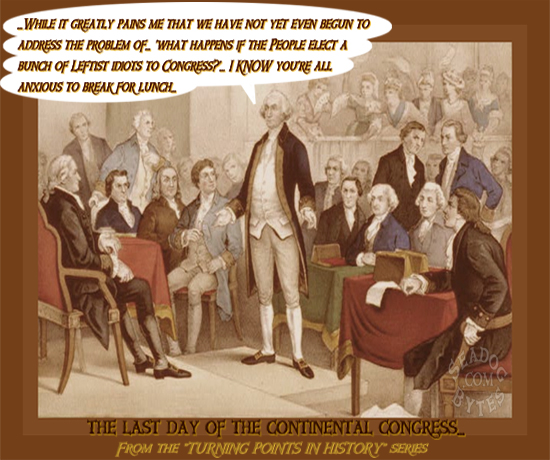
If there is a bright side to an otherwise pessimistic assessment of the nation's future, it is that the American people are now aware of what their government is doing. As a result of the 2008 elections, all three branches of the federal government are now under Democratic control. And these are not the old-fashioned Jacksonian Democrats or "New Dealer" Democrats, whose patriotism and good faith could not be questioned, but 1960s radicals--those we have called the "New Left" or "Neo-Marxists." The current president is too young to be a 1960s radical, but he has spent most of his life surrounded by them. In addition the Democrats have controlled both houses of Congress since the 2006 elections, and they have a 5-4 majority in the Supreme Court.
Of course, not everything done by a government full of extremists will succeed, and this one will blame its failures on either the opposition or the previous government, using some variant of "It's Bush's fault!" But with them in total control, the public will only accept that excuse for so long, and judging from recent protests, the honeymoon the American people gave to Obama is over already. Since 2009, there have been multiple "Tea Party" protests around the country, against the current government's tax-and-spend behavior.(17) Over the years, poll after poll has shown that most Americans are center-to-right in their social and political opinions. They may have voted against an inept Republican Party in 2006 and 2008, but they didn't want the new government declaring war on small business and capitalism, or otherwise pursuing a far left agenda; most of this was invisible during the election campaigns.
We have also noted that no president or political party since the 1920s, not even Reagan, has been able to halt the growth of the government and its spending habits. This is mainly because the public has usually been apathetic, while the media, entertainment industries, schools and federal bureaucracies have come increasingly under leftist control, and thus are against moves to cut big government's power. It would probably take a national catastrophe to change this trend, like a major depression or a war, and many are now realizing that it will happen, if the current group of leftists have their way.
True believers on the Left are responsible for the recent awakening, too, because instead of having the humility to act quietly, they are moving heaven and earth to achieve their goals, and want the credit for doing it. Having the same faith and dedication towards government that the religious have towards God, they are convinced that nearly everyone shares their philosophy and attitude, because their people were elected; anyone who does not agree with them must be demonized (see the Jefferson cartoon), or at least made to feel guilty. It has been said that you can judge a person's character by whom he associates with, and the current president's reliance on a cheerleading mainstream media, "community organizer" groups like ACORN, power-hungry unions, corrupt Chicago-style politics, and congressmen who pass his bills before they are even fully written, is starting to backfire, thanks to their failings being pointed out by the "new media" of FOX News, talk shows and bloggers.
In the past, when a radical government reached too far, trying to accomplish things too fast (and in this case, spending too much money to do it), voters were aroused and turned it out of office at the next election. As Sir Isaac Newton put it when talking about physics, "for every action there is an equal and opposite reaction" A political reaction replaced the "Free Soil" Republicans in 1868, and it happened to the Democrats in 1980 and 1994. Some conservatives are starting to compare Barack Obama with Jimmy Carter for that reason, but at this date (2009) there isn't a charismatic conservative like Ronald Reagan to take his place, except maybe for Sarah Palin. To go back to the frog-in-the-pot analogy, now that the heat has suddenly been turned up to "high," is it too late for the frog to jump out of the pot?
Of course after the rascals have been turned out, their replacements may act nearly the same way, and the voters may go back to sports, reality shows, shopping at the mall, or doing whatever else interests them. The trick is whether the public can overcome its short attention span and repair the damage done to American society over the past few decades. Then we will know if the nation's decline and fall have been prevented (at least for our lifetime), or if the nation simply received another reprieve. If you are a US citizen, you have just finished reading American history; are you now ready to make it?
"Freedom is never more than one generation away from extinction. We didn't pass it to our children in the bloodstream. It must be fought for, protected, and handed on for them to do the same."--Ronald Reagan
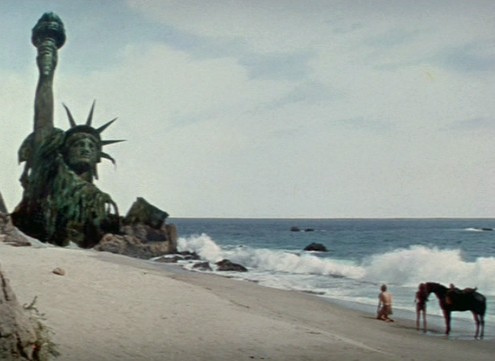
This is the End of Chapter 6.

FOOTNOTES

1. It is remarkable how few records of Obama have been released to the public, covering his life before he ran for the US Senate in 2004. The certificate of live birth posted on the Internet during the election was too vague to be convincing, but Obama's staff waited until 2011 to release a more detailed birth certificate in its place. Other missing records include his Selective Service Registration, the grades and papers from the colleges he attended (Occidental College, Columbia University and Harvard Law School), scholarly articles published while in those schools, medical records, and baptismal records from the church he attended in Chicago. Even many records of his attendance and voting in the Illinois State Senate are not available, prompting some to call the period from 1995 (when he first ran for the State Senate) to 2004 the "lost years."
2. The New York Times promoted McCain as the ideal Republican candidate as 2008 began, only to call him "mean-spirited" and publish rumors about him, after he defeated his rivals; by then the Times had switched its endorsement to Obama. John O'Sullivan, columnist and former editor of National Review, explains the media's liberal bias with what he calls O'Sullivan's First Law: "All organizations that are not actually right wing will over time become left wing." Examples of other organizations whose agendas have gradually gotten more leftist include the American Civil Liberties Union, the Ford Foundation, the League of Women Voters, the YWCA, UNESCO, UNICEF, Planned Parenthood, the Episcopal Church, Canada and most of Europe.
3. If anyone can be blamed for the failure of Fannie Mae and Freddie Mac, it is Congressman Barney Frank (D-MA). While he was pushing those companies to make bad loans, he had a homosexual affair with Herb Moses, a Fannie Mae executive, from 1991 to 1998. Because Frank was on the Financial Services Committee, this was clearly a conflict of interests, but nobody wanted to talk about it, out of fear of being called a "homophobe." When the real estate industry crashed, Frank was chairman of the House Financial Services Committee, meaning that he was in charge of fixing the mess he helped to create! Nor is this the only time his sex life got him into trouble; a previous boyfriend had run an escort service out of Frank's apartment. Apparently he never learned that it's not a good idea to date, while in Congress.
4. "One of the greatest perils which threatens us now is the tendency to centralization, the absorption of the rights of the States, and the concentration of all power in the General Government. When that shall be accomplished, if ever, the days of the Republic are numbered."--Orville Browning, Secretary of the Interior under President Andrew Johnson
5. "A recent analysis of the costs of government bailouts due to the housing crisis, the credit crisis and other economic woes tallies up to $8.5 trillion--more than the cost of all U.S. wars, the Louisiana Purchase, the New Deal, the Marshall Plan and NASA space program spending--all combined and adjusted for today's dollars."--former astronaut James Lovell, comparing Washington's bailout spending in 2008 with the National Aeronautics and Space Administration, which was short on cash at the same time.
6. In Chapter 4, footnote #70, we looked at an unnecessary tax that had been collected for more than a century, simply because no one was paying attention. Sometimes expenditures are like that, too. One example is the mohair subsidy. The wool of Angora goats was used to make army uniforms during World War II, and after the war, Congress grew concerned about a possible mohair shortage when the next war broke out, so it paid farmers to grow more of that kind of wool. Instead, mohair production declined, and it wasn't even needed, because a few years later, the armed forces introduced uniforms made out of synthetic fabrics. Nevertheless, the mohair subsidy remained on the books, until Congress voted to abolish it in 1993. It wouldn't stay abolished, though, and lobbyists on behalf of the farmers receiving it, like the Navajo Indians, got the subsidy restored a few years later, so mohair producers are still getting their checks from the government today.
7. "The nearest thing to eternal life we will ever see on this earth is a government program."--Ronald Reagan
8. The Federal Emergency Management Administration is a good example of how "mission creep" can cause a government agency to outgrow its original purpose. FEMA was created to assist states and municipalities dealing with catastrophic events, like nuclear attacks, major earthquakes and killer hurricanes. But these kinds of disasters don't happen every year, so FEMA redefined the meaning of "emergency" to justify its funding. By 1996 it was paying for snow removal in a Connecticut town that hadn't set aside enough money for the job, and just before his presidency ended, George W. Bush declared Washington D. C. a disaster area, making it eligible for FEMA funds, because Barack Obama's 2009 inauguration cost more and drew larger crowds than expected. Who'd have thought, in a country that has never experienced a coup d'etat, that the changing of presidents would be seen as a "national emergency"? When first-class disasters finally struck, namely Hurricane Katrina in 2005 and Hurricane Sandy in 2012, FEMA was too bloated to respond effectively.
9. An example of ignoring the Constitution is the appointment of special-policy "czars," executives that are answerable to nobody but the president. Like the White House Chief of Staff, they have the power of Cabinet-level officials, but do not have a department underneath. It is unlikely that the Founding Fathers would have approved of such appointments. The first federal officials to be called "czars" held temporary jobs during World War II; FDR had what The Washington Post called a "transportation czar," a "manpower czar," and a "production czar," to make sure the nation's resources were used efficiently. After that, the term did not appear again for thirty years, until Nixon hired two special advisors, a "drug czar" and an "energy czar." The "energy czar" position disappeared when Carter created the Department of Energy, but both Carter and Reagan kept a "drug czar" on call. After that, George H. W. Bush had no czars in his administration, Clinton had three czars, and George W. Bush had four. But during that time, the Democrats became enamored with European-style controlled economies, so after Obama was elected, he appointed between thirty-two and forty-four czars in the first six months of his presidency, depending on your definition of what a "czar" is. These included a border czar, a health reform czar, an urban czar, a terrorism czar, a Guantanamo closure czar, a car czar, a green jobs czar, and even a "safe schools czar" and a "CEO pay czar" (to oversee how the bailout money given to corporations was handled). He may also have done it because most of the czars were left-wing ideologues, who would have faced a long, uphill confirmation process, if they were Cabinet or Supreme Court nominees. The Romanov dynasty gave Russia eighteen czars between 1613 and 1917, and seven previous rulers, starting with Ivan IV, also claimed the title, so Obama has the dubious distinction of producing more czars than the Russians!
10. Former UN Ambassador John Bolton called Obama the first "post-American president who's above all that patriotism stuff."
11. The Christian Science Monitor, April 7, 2009.
12. "Of all tyrannies, a tyranny exercised for the good of its victims may be the most oppressive. It may be better to live under robber barons than under omnipotent moral busybodies. The robber baron's cruelty may sometimes sleep, his cupidity may at some point be satiated; but those who torment us for our own good will torment us without end, for they do so with the approval of their own conscience." --C. S. Lewis
13. "Until then, all I ask of my country is that we don't beat ourselves and that we remain a place where Gwyneth Paltrow refuses to live."--Comedian Dennis Miller, December 8, 2006.
14. "Might Washington, like Rome, fall victim to imperial overstretch? Could military force abroad eventually have to be withdrawn because of bankruptcy at home? Might the whole idea of America eventually be challenged and destroyed by some charismatic new faith: some fundamentalist variant on Christianity? Or will nature disrupt America's new world order?"--Robert Harris, "Does Rome's fate await the US?," Sunday Mail, October 12, 2003
15. "A democracy cannot exist as a permanent form of government. It can only exist until the voters discover that they can vote themselves largesse (generous gifts) from the public treasury. From that moment on, the majority always votes for the candidates promising the most benefits from the public treasury, with the result that a democracy always collapses over loose fiscal policy, (which is) always followed by a dictatorship. . . . The average age of the world's greatest civilizations has been two hundred years. These nations have progressed through this sequence. From bondage to spiritual faith; from spiritual faith to great courage; from courage to liberty; from liberty to abundance, from abundance to complacency; from complacency to apathy, from apathy to dependence, from dependence back into bondage."--Alexander Tyler, a Scottish historian, circa 1787
16. "You never want a serious crisis to go to waste. What I mean by that is it's an opportunity to do things you couldn't do before."--Rahm Emmanuel, Obama's chief of staff during his first term.
17. The term "Tea Party" has two meanings. Not only is it a reference to the Boston Tea Party, but "tea" can stand for "Taxed Enough Already."
Support this site!

PAGE NAVIGATOR
The Anglo-American Adventure
|
Other History Papers |
Beyond History
|
